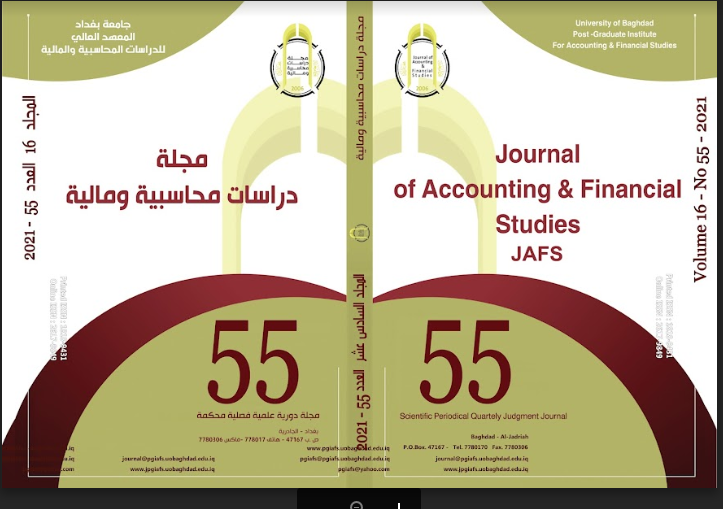أثر شهادات الإيداع الإسلامية (ICD) الداخلية على ربحية المصارف الإسلامية
بحث تطبيقي في مصرف آسيا العراق الإسلامي
الكلمات المفتاحية:
مصرف الإسلامي، شهادات الإيداع الإسلامية، الربح، ربحية المصارف الإسلاميةالملخص
طالما المصارف الإسلامية لا يمكنها أن تعمل في ظل بيئة تتعامل بأدوات الصيرفة التقليدية القائمة على أساس سعر الفائدة (الربا المصرفي) الذي تحضره المادة رقم (6) من قانون المصارف الإسلامية رقم (43) لسنة 2015 التي نصت على أن (لا تتعامل بأي نشاط يحمل فائدة (لا أخذاً ولا عطاءً)). لذلك تسعى إلى تقديم حلاً استراتيجياً بديلاً في إطار أحكام وقواعد الشريعة الإسلامية، على أساس المشاركة في الربح والخسارة لتجنب أسلوب الفائدة أخذاً وعطاءً، لإيجاد أساليب استثمارية لتقديم منتجات مالية جديدة، كشهادات الإيداع الإسلامية والصناديق الاستثمارية وفق أسلوب المرابحة والمضاربة والمشاركة وغيرها؛ لمساهمتها الفاعلة في زيادة أرباح المصارف الإسلامية، التي تمثل أحد الأهداف الرئيسية وراء وجود المصارف، وأمراً ضرورياً لبقائها واستمرارها في مزاولة أعمالها. يهدف البحث إلى بيان دور البنك المركزي العراقي (CBI) في سعيه إلى إدخال آلية ونافذة استثمارية جديدة (شهادات الإيداع الإسلامية) للمصارف الإسلامية لاستثمار أموالها بدون فائدة ربوية ودورها في ربحية المصارف الإسلامية. وترتكز فرضية البحث على وجود علاقة تأثير إيجابية ذات دلالة معنوية بين استثمار المصارف الإسلامية في شهادات الإيداع الإسلامية وربحية مصرف آسيا العراق الإسلامي خلال المدة الزمنية من نصف الأول/ لسنة 2018 إلى نصف الأول لسنة/ 2020. واعتمد البحث على أدوات التحليل المالي لتحليل نسب نمو عوائد المرابحة المتحققة على المبالغ المستثمرة في شهادات الإيداع الإسلامية (ICD) (X) للمصرف المسـتثمر أمواله فيها. فضلاً عن استخدم الباحثان النسب المالية لمؤشرات الربحية (نسبة العائد على الموجودات (ROA) (Y1)، نسبة العائد على حقوق الملكية (ROE) (Y2))، بالاعتماد على البيانات المالية لاسيما الميزانيات العمومية وكشوفات الدخل للمصرف. وتوصل الباحثان إلى أن عائد مرابحة شهادات الإيداع الإسلامية ساهم في زيادة ربح المصرف من خلال ما توفره هذه الشهادات من فرص للمصارف الإسلامية لاستثمار فائض سيولتها بالرغم من إصدارها بصيغة المرابحة فقط. وأن هذه الشهادات يزداد عائدها المرابحة بزيادة أجل مدة استثمارها. وأيضاً المصارف الإسلامية اقتصر دورها في العراق على شراء شهادات (ICD) من البنك المركزي (CBI) دون أن تقوم ببيعها إلى الزبائن وكذلك لم تقم بإصدارها لغرض تمويل المشاريع الاقتصادية. وصى الباحثان بالإمكان الاستفادة من تجارب دول العالم في إصدار شهادات الإيداع الإسلامية بصيغ تمويل متنوعة مثل المضاربة كما في دولة قطر وبصيغة الإجارة كما في المغرب والمشاركة وغيرها. وكذلك التأكيد على البنك المركزي العراقي (CBI) بإصدار تعليمات لتطوير آلية شهادات الإيداع الإسلامية وفق النظام العالمي المتبع، ليساعد المصارف الإسلامية على إصدار هذه الشهادات لتمويل المشاريع الاقتصادية من أجل المساهمة في تحقيق التنمية الاقتصادية. كما أنّنا نؤكد على المصارف الإسلامية تنويع محافظها الاستثمارية والمشاركة بكافة آجال الشهادات لاسيما طويلة الأجل لأنها تدر عائدً أكبر.
التنزيلات
منشور
إصدار
القسم
الرخصة
يتمّ نقلُ حقوق النّشر إلى المجلّة عند إخطار الباحث بقَبول بحثه المقدّم للنّشر في المجلّة.





